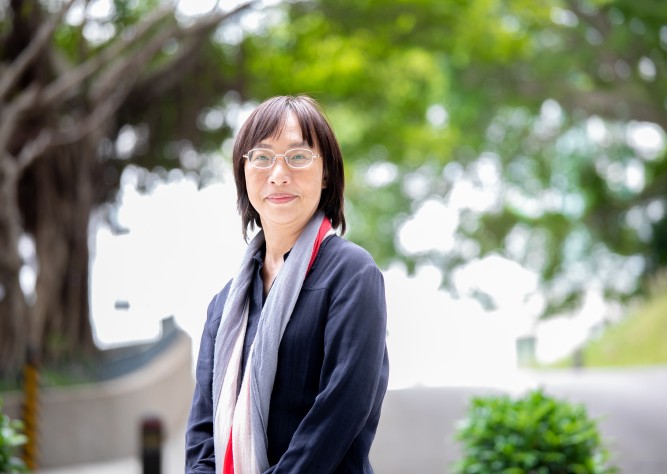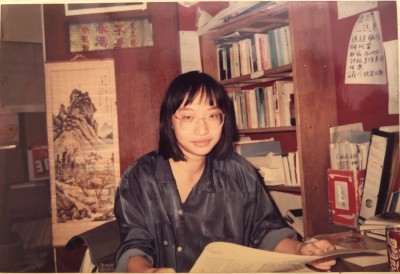From Foxconn to Tin Shui Wai: Prof Pun Ngai tackles social and labour problems with research

"If research is not to solve problems, what is its purpose? I aim to give the results of my research to society," says Prof Pun Ngai, newly appointed Chair Professor of Lingnan University's Department of Cultural Studies.
An internationally renowned scholar of labour issues in China, in 2005 Prof Pun was the first Asian scholar to win the prestigious C. Wright Mills Award with Made in China: Women Factory Workers in a Global Workplace. Her highly respected and acclaimed book, Dying for an iPhone: Apple, Foxconn and Lives of the Chinese Workers, has been translated into several languages.
Prof Pun’s interest in China’s labour issues -- in particular the predicament of rural migrant and female labourers – was aroused when she was studying at the Chinese University of Hong Kong. “I was a member of the China Study Society. Back then, there were several factory fires in the Mainland. The China Study Society, classmates, and alumni organised fundraising activities, and I was appointed to go there and interview some of the female workers who had been burned. This experience had a significant impact on me.”
Over the next 20 years, Prof Pun travelled to various cities on the Mainland. “First, it was the poor working and employment conditions facing migrant women workers in the Pearl River Delta. After conditions improved, I went to Beijing for six to seven years, to address the issue of labour contracts for construction workers,” she says.

Prof Pun’s interest in China’s labour issues was aroused when she was an undergraduate.
“Beijing carried out a lot of building projects for the 2008 Olympic Games, and many construction workers didn’t get paid for their work at the end of the year. Unlike Hong Kong, construction workers in Mainland are paid only upon completion of a project or at the end of the year. They tried to take action against their employers for payment, but since there were almost no labour contracts, government departments and labour unions could do nothing. So for several years our research team wrote books and articles addressing the issue, and we took students to the field to find solutions to improve the situation together.”
In 2010, Foxconn, which assembles phones for Apple Inc., had a spate of suicides in its Mainland factories. These not only attracted the attention of the press globally, but also persuaded Prof Pun and her research team to relocate from Beijing to the Pearl River Delta.
“A senior executive of Foxconn pointed out that Chinese workers commit suicide for the compensation of several hundred thousand yuan for their poor families, and that the company would no longer indemnify those who committed suicide. We were outraged at this. Not long after this announcement, a female worker jumped off a building and was paralysed. We wrote a lot of reports and put pressure on the government. In the end, Foxconn agreed to pay her 180,000 yuan, which is actually only a small amount of money,” Prof Pun says, but after that Foxconn started to pay attention to improve the working conditions of its employees.
To Prof Pun, teaching is as important as research and Lingnan's philosophy of focusing on the balanced development of research and teaching was the main reason she wanted to join the University. “A liberal arts education attaches great importance to relationships with society and interaction with students, and I firmly believe that research and teaching are closely linked,” she says.
Prof Pun believes that research and teaching can be a winning combination.
“I like going out with my students to do fieldwork. We meet workers, listen to their stories and try to understand their needs. Then these assignments -- if of good quality -- could become solid research material for the reports we send to relevant parties such as labour unions and corporates like Apple and Foxconn, alerting them to their social commitments and responsibilities, and the welfare of their employees. In other words, my students’ ‘homework’ not only has a positive impact on society, but also motivates and encourages students to learn and care more through realising that what they are doing is worthwhile.”
Recently, Prof Pun and a group of Lingnan students went to Tin Shui Wai to look at the difficulties and challenges of job-hunting and unemployment for young people. They also visited a social enterprise called Tin Zi Zok Wai, formed by a group of immigrated women, and plan to promote its eco-village framework with “time-voucher” labour hours and a product redeeming system.
“I’m exploring ways of showing the life and culture of Hong Kong grassroots through students. For example, Tin Shui Wai is a community with many recent immigrants and grassroot workers. How can we tell their stories? How can we make people understand the contribution they make to society, and that they are not, as some media portray them, parasites who want to take advantage of society?” she asks.
Prof Pun points out that neither the quantity nor quality of research on Hong Kong’s livelihood issues, and the social policies themselves, are ideal. “Many livelihood policies in Hong Kong are worse than the Mainland’s. For instance, while several small cities on the Mainland offer unemployment insurance to their citizens, Hong Kong, which has huge reserves, does not. I think the Government is relatively ungenerous in terms of livelihood policies and it refuses to solve certain problems directly. These policies provide us, as scholars, with much room for research.”
Prof Pun is also undertaking a large-scale project which explores how Chinese corporates assist in the development of infrastructural capitalism. “Under this development of new capitalism, what will the emerging pattern of labour be and what different policies will be introduced? I have never stopped studying the Mainland,” she smiles.
In the future, Prof Pun will continue to combine both research and teaching to add to the academic achievements of the University. “As a teacher, the more you do and the more effort you put into guiding students to do meaningful research, the richer the rewards. Students can help you perform field experiments, and when they interview and contact people and conduct research, as well as bringing back a lot of useful information they make the school more approachable to the community. My own experience is that as long as I find the right methods, research and teaching can be a winning combination.”

